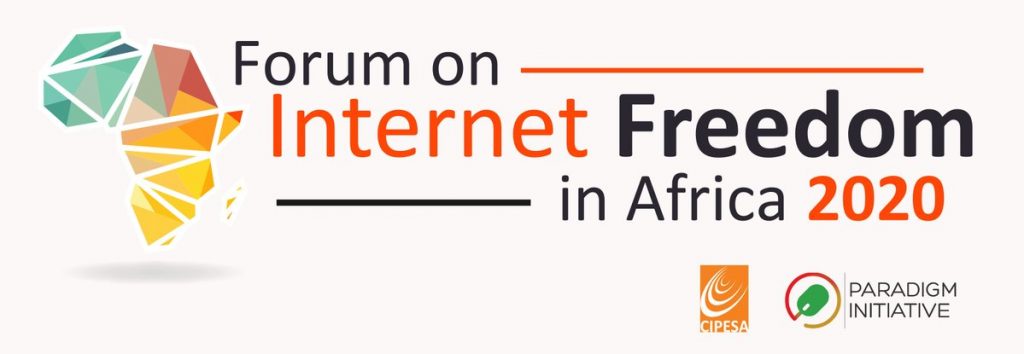On September 28-30, 2020, the seventh edition of the annual Forum on Internet Freedom in Africa (FIFAfrica) will be co-hosted by the Collaboration on International ICT Policy for East and Southern Africa (CIPESA) and Paradigm Initiative (PIN). This landmark event convenes a spectrum of stakeholders from across the internet governance and digital rights arenas in Africa and beyond to deliberate on gaps, concerns and opportunities for advancing privacy, free expression, non-discrimination and the free flow of information online.
The CIPESA-Paradigm Initiative partnership on FIFAfrica20 builds on the two organisations’ longstanding commitment to advance digital rights in Africa. It echoes the joint vision of a continent that respects, protects and promotes digital rights and strives to ensure that no one is digitally left behind.
In light of the current Covid-19 reality, FIFAfrica20 will adopt a hybrid approach which blends online and physical interactions. Over the course of three days, the FIFAfrica20 agenda will feature physical and virtual engagements, including satellite events in select countries, virtual sessions, and pre-recorded content. All interactions will maintain national Standard Operating Procedures (SOPs). Meanwhile, web streaming and social media will be utilised to reach and engage disparate audiences keen on participating in the Forum.
These measures will support FIFAfrica in continuing to be a platform where the rising challenges to the enjoyment of internet freedom in various African countries, including arrests and intimidation of online users, internet disruptions, and a proliferation of laws and regulations that undermine the potential of digital technology to drive socio-economic and political development, can be deliberated upon amongst a wide array of stakeholders.
Indeed, as the coronavirus continues to spread globally, various African governments have imposed sweeping measures such as travel bans, curfews, prohibition of mass gatherings, mandatory quarantines, closure of learning institutions, entertainment spots and borders to curb the pandemic. Some of these measures have boosted the use of digital technologies, including digital financial services and subsidised internet access.
However, the potential of technology to aid the containment of the spread of the coronavirus notwithstanding, the internet is now also posing a significant threat to fighting the pandemic. In many African countries, social media has been awash with speculation, false and misleading information on Covid-19. This has resulted in some legislative responses criminalising the spread of fake news related to Covid-19. In some countries, technology-based responses to the pandemic are marred by pre-existing regressive measures such as digital taxation and internet disruptions, which continue to undermine access to crucial information and the enjoyment of digital rights.
Meanwhile, there is a growing concern that minority and marginalised communities such as refugees and persons with disabilities are being left behind in accessing information on Covid-19. This is because, despite the recent expansion in ICT usage, digital exclusion persists due to limited access and affordability of the requisite ICT tools, and shortage of content in accessible formats.
As such, this year, FIFAfrica will respond to how coronavirus-related government responses and restrictions are harming the enjoyment of digital rights, including the right to privacy and personal data protection, the right of access to information, and freedom of expression and association.
The conveners of FIFAfrica recognise that internet freedom is multi-faceted, and just like it requires to have a multiplicity of stakeholders working jointly, it also requires a diversity in the voices, backgrounds, viewpoints, and thematic work areas of those that attend FIFAfrica. As such, there are continued proactive efforts to include marginalised communities and at-risk groups in attendance, on panels, workshops and in session themes. FIFAfrica also puts internet freedom on the agendas of key actors including African policy makers, regulators, human rights defenders, academia, law enforcers, developers of internet freedom tools, and the media, paving the way for broader work on advancing digital rights on the continent and promoting the multi-stakeholder model of internet governance.
Hosting a hybrid FIFAfrica as a partnership between CIPESA and PIN keeps the stride of remaining responsive to the technology landscape in Africa and expanding the conversation on digital rights. FIFAfrica was initially hosted in Kampala, Uganda in 2014-2016. Since then, its expanding footprint has seen it being hosted in Johannesburg, South Africa in partnership with the Association for Progressive Communications (APC) in 2017, and in Accra, Ghana in partnership with the Media Foundation for West Africa (MFWA) in 2018. In 2019, FIFAfrica was hosted in Addis Ababa, Ethiopia, alongside the Ethiopia Ministry of Innovation and Technology (MINT).


